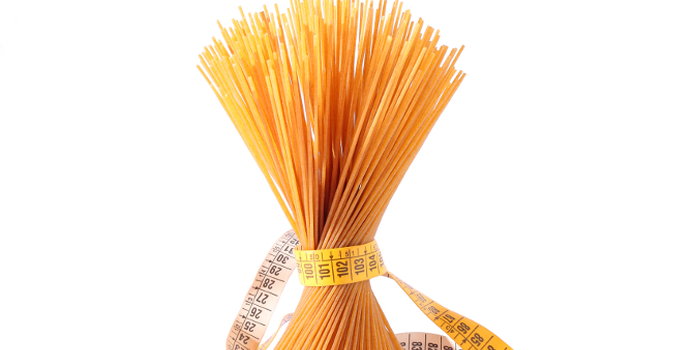For the average person, a healthy diet should be 45-65% carbohydrates. For many people, pasta is a carbohydrate favorite. As with all carbohydrates in your diet, you should be selecting primarily complex carbohydrates or carbohydrates naturally occurring in fruits, legumes and vegetables. Complex carbohydrates are important because they still contain the nutrients essential for good health. They are found in foods like beans, vegetables, peas, and whole grains. Whole grains contain the entire grain kernel: the bran, germ, and endosperm. Although complex carbohydrates also become fuel to your body, they are important because they provide vitamins, minerals and fiber that may not be found in processed simple carbohydrate products like white pasta or white flour. White pasta may have a finer texture and a longer shelf life but it removes the B vitamins, iron and fiber.
Choosing whole wheat or whole grain pasta is a great option for a complex carbohydrate choice. But whole wheat pasta can take some adjusting to -- the mouthfeel and flavor can be quite a change for those who have been accustomed to white pasta. But the popularity of whole grain choices has greatly improved the products available recently, so if you haven't tried whole wheat pasta yet, give it a try! Cook many different types in different recipes until you find something you really enjoy.
Comparing Pasta Choices
When reading the label on whole wheat/grain pastas, you may find that many of them say "whole durum wheat flour" or "whole semolina flour." This just means that they are coarsely ground wheat flours which are favored because they are higher in protein. Choose products high in fiber and protein, because sometimes the product may be brown because of food additives like molasses, not necessarily indicating that it is a whole grain.
In a 1 cup/140-calorie serving of cooked whole wheat pasta, there are 174 calories, 7 grams of protein and 6 grams of fiber, which is about 25% of your daily fiber needs! It is a low-fat food and contains high levels of manganese and selenium, which are minerals important in maintaining bone health and immune function.
Whole Wheat Pasta and Fiber
One of the top reasons why whole wheat pasta is good for your is the fiber content. The USDA states, "Dietary fiber from whole grains or other foods may help reduce blood cholesterol levels and may lower risk of heart disease, obesity, and type 2 diabetes. Fiber is important for proper bowel function. It helps reduce constipation and diverticulosis. Fiber-containing foods such as whole grains help provide a feeling of fullness with fewer calories."
So not only does fiber help lower your risk for disease, it also helps your weight management goals by helping you feel fuller longer. Fiber does this by slowing the digestion of food, and some fiber is not digested but passes through your body, further improving bowel function. Choosing whole wheat pasta choices can be a great addition to a healthy diet!

Emily DeLacey MS, RD is a Registered Dietitian and currently working in Jamaica as a HIV/ AIDS Prevention Specialist. She attended Central Washington University for her Bachelor's Degree in Science and Dietetics and continued on after her internship to Kent State University for her Master's Degree in Science and Nutrition, with a focus on public health and advocacy. She served as a U.S. Peace Corps Volunteer in Malawi 2012-2014 working as a Community Health Advisor in a rural village, immersing in the joys of life without electricity or running water. She has been to 20+ countries and 47 of the 50 states in the US. Traveling, adventuring and experiencing new cultures has made her a passionate advocate for the equality of nutrition and wellness for all people.



